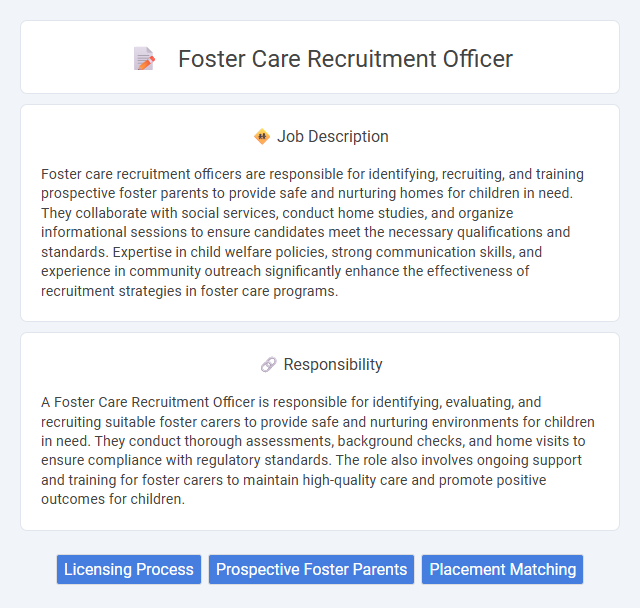
Foster care recruitment officers are responsible for identifying, recruiting, and training prospective foster parents to provide safe and nurturing homes for children in need. They collaborate with social services, conduct home studies, and organize informational sessions to ensure candidates meet the necessary qualifications and standards. Expertise in child welfare policies, strong communication skills, and experience in community outreach significantly enhance the effectiveness of recruitment strategies in foster care programs.
Individuals with strong interpersonal skills and a genuine passion for child welfare are likely to find the foster care recruitment officer role suitable. Candidates who can handle emotionally challenging situations and demonstrate resilience may have a higher probability of success in this position. Those lacking empathy or effective communication abilities might struggle to meet the demands of this job.
Qualification
A Foster Care Recruitment Officer must possess a background in social work, psychology, or related human services fields, typically requiring a bachelor's degree. Essential qualifications include experience in child welfare or family support services and strong interpersonal skills for effective communication with potential foster families. Proficiency in assessment techniques, case management, and knowledge of local child protection laws enhances recruitment success and ensures the placement of children in safe, supportive homes.
Responsibility
A Foster Care Recruitment Officer is responsible for identifying, evaluating, and recruiting suitable foster carers to provide safe and nurturing environments for children in need. They conduct thorough assessments, background checks, and home visits to ensure compliance with regulatory standards. The role also involves ongoing support and training for foster carers to maintain high-quality care and promote positive outcomes for children.
Benefit
Working as a foster care recruitment officer likely offers the benefit of making a meaningful impact on children's lives by helping place them in safe, supportive homes. The role may provide opportunities for professional growth within social services and community outreach. Competitive salaries and benefits packages are often part of the compensation, enhancing job satisfaction and stability.
Challenge
Foster care recruitment officers likely face the challenge of identifying and engaging suitable candidates who can provide stable, supportive environments for children in need. The role may require balancing stringent regulatory requirements with the emotional and logistical complexities inherent in the foster care system. It is probable that these officers must continuously adapt strategies to address community perceptions and resource limitations effectively.
Career Advancement
Foster care recruitment officers play a critical role in identifying and engaging potential foster parents, utilizing strong communication and interpersonal skills to expand the pool of available caregivers. Career advancement opportunities include moving into senior recruitment roles, child welfare program management, or policy development positions within social service agencies. Specialized training in child welfare, leadership skills, and a track record of successful recruitment outcomes significantly enhance promotion prospects in this field.
Key Terms
Licensing Process
A Foster Care Recruitment Officer oversees the licensing process to ensure all prospective foster parents meet state and agency requirements, including background checks, home studies, and training completion. They coordinate with social services and licensing authorities to verify compliance with health, safety, and legal standards. Maintaining thorough documentation and timely communication throughout the licensing process is critical for efficient placement of qualified foster families.
Prospective Foster Parents
Foster care recruitment officers play a critical role in identifying and engaging prospective foster parents to provide safe, nurturing homes for children in need. They conduct thorough assessments, offer guidance on eligibility, and facilitate training sessions to prepare families for fostering responsibilities. Effective recruitment officers use targeted outreach strategies to attract diverse candidates committed to supporting the well-being and development of foster children.
Placement Matching
A Foster Care Recruitment Officer specializes in identifying and recruiting suitable foster families by assessing their capabilities and aligning them with the unique needs of children in care. Expertise in placement matching ensures that children are placed in environments that support their emotional, educational, and developmental growth. Utilizing detailed profiling and thorough background checks enhances successful matches and promotes long-term stability for foster children.
 kuljobs.com
kuljobs.com